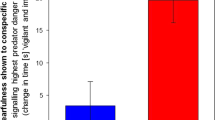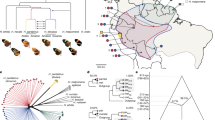Abstract
Cooperation between two or more individuals has been shown to yield short-term benefits in several vertebrate species1–4, and various hypotheses have been developed to explain the evolution of cooperative behaviour5–7. However, until now there has been no evidence to show that such cooperation actually does confer lifetime's reproductive advantages on more than one member of the coalitions concerned8,9. Long-term studies of wild lions (Panthera leo L.) have now provided such evidence. We show that, compared with singletons and pairs, male lions in groups of three or more can more reliably gain tenure of female prides, retain tenure for longer, mate with more different females, and produce more surviving offspring; thus each individual has higher fitness through cooperation.
This is a preview of subscription content, access via your institution
Access options
Subscribe to this journal
Receive 51 print issues and online access
$199.00 per year
only $3.90 per issue
Buy this article
- Purchase on Springer Link
- Instant access to full article PDF
Prices may be subject to local taxes which are calculated during checkout
Similar content being viewed by others
References
Packer, C. Nature 265, 441–443 (1977).
Schaller, G. B. The Serengeti Lion (Chicago University Press, 1972).
Kruuk, H. The Spotted Hyena (Chicago University Press, 1972).
Emlen, S. T. in Behavioural Ecology: An Evolutionary Approach (eds Krebs, J. R. & Davies, N. B.) (Blackwell, Oxford, 1978).
Hamilton, W. D. J. theor. Biol. 7, 1–52 (1964).
Maynard Smith, J. & Ridpath, M. G. Am. Nat 106, 447–452 (1972).
Trivers, R. L. Q. Rev. Biol. 46, 35–57 (1971).
Hrdy, S. B. The Langurs of Abu (Harvard University Press, 1978).
Watts, C. R. & Stokes, A. W. Scient. Am. 224, 112–118 (1971).
Bertram, B. C. R. J. Zool. Lond. 177, 463–482 (1975).
Bertram, B. C. R. E. Afr. Wildl. J. 11, 215–225 (1973).
Hanby, J. P. & Bygott, J. D. in Serengeti: The Dynamics of an Ecosystem (eds Sinclair, A. R. E. & Norton-Griffiths, M.) (Chicago University Press, in the press).
Pennycuick, C. J. & Rudnai, J. J. Zool., Lond. 160, 497–508 (1970).
Bertram, B. C. R. in Growing Points in Ethology (eds Bateson, P. P. G. & Hinde, R. A.) (Cambridge University Press, 1976).
LeBoeuf, B. J. Behaviour 41, 1–26 (1972).
Gibson, R. M. & Guinness, F. E. J. Anim. Ecol. (in the press).
Wilson, E. O. Sociobiology (Belknap, Harvard, 1975).
Author information
Authors and Affiliations
Rights and permissions
About this article
Cite this article
Bygott, J., Bertram, B. & Hanby, J. Male lions in large coalitions gain reproductive advantages. Nature 282, 839–841 (1979). https://doi.org/10.1038/282839a0
Received:
Accepted:
Issue Date:
DOI: https://doi.org/10.1038/282839a0
This article is cited by
-
Collaborative behaviour and coalitions in male jaguars (Panthera onca)—evidence and comparison with other felids
Behavioral Ecology and Sociobiology (2022)
-
A new classification of mammalian uni-male multi-female groups based on the fundamental principles governing inter- and intrasexual relationships
Behavioral Ecology and Sociobiology (2021)
-
The role of kinship and demography in shaping cooperation amongst male lions
Scientific Reports (2020)
-
Competitive ability determines coalition participation and partner selection during maturation in wild male chimpanzees (Pan troglodytes schweinfurthii)
Behavioral Ecology and Sociobiology (2020)
-
Bacterial Contribution in Chronicity of Wounds
Microbial Ecology (2017)
Comments
By submitting a comment you agree to abide by our Terms and Community Guidelines. If you find something abusive or that does not comply with our terms or guidelines please flag it as inappropriate.



